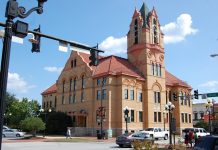By Stan Welch
The Anderson County Council entered Tuesday night’s council meeting with a couple of controversial matters on the agenda – third reading of an animal control measure and first reading of a proposed hospitality tax.
The animal control ordinance was pulled from the agenda because it needs additional tweaking of the legal language, according to Councilman Tom Allen, who sponsored the amended ordinance. Nevertheless, the proposed hospitality tax generated more than enough controversy and dissension among the Council.
The proposed tax would add a two per cent charge on all prepared foods and beverages sold in the unincorporated areas of the county. Every municipality in the county has already adopted the same tax, and have seen tremendous revenues generated for use in recreational activities and other uses designed to increase tourism. The county tax, if passed, would not be added to the existing municipal taxes.
Several Council members had significant issues with the proposed tax, and their issues were varied. Councilwoman Cindy Wilson said she needed a great deal more information; ranging from how many, if any, additional employees would be needed to administer and account for the revenues generated to concerns about what she described as the tyrannical authority of the county to review the books of private businesses to confirm the revenues collected and reported.
“This seems dictatorial, almost communistic to me, that we could go in and demand to see their books. This establishment of a business registration, is that a business license? And looking at the list of proposed projects, this looks like they are slanted towards the members who have been out stumping for this tax.”
County attorney Leon Harmon explained that the business registration is in fact separate from a business license, and is authorized by state law. Such authority to review the financial records of private business is already in place, and it available for the administration of the accommodations tax, for example.
Wilson proposed an amendment to the ordinance that would have referred it to the people in a referendum, instead of a simple majority vote of Council. “I think we should get some more information and take it out to the people, then let them decide.” The referendum method is required in the case of a local option sales tax, but the enabling legislation for the hospitality tax is written differently. While a referendum is not required, it is not prohibited.
District Two Councilwoman Gracie Floyd disagreed with Wilson, saying that legislative bodies all over the state have enacted this tax without using a referendum. “ We were elected to make the tough decisions ourselves. I am certainly as smart as those who have done this elsewhere. Don’t you think you are?”
Wilson’s proposal was defeated by a vote of 2-5 with only Chairman Tommy Dunn supporting it.
Floyd then presented her objections to the proposed tax. They centered entirely on the proposed list of projects and expenditures. She had no issues with the tax itself. “It is part of government’s job to provide what the people need. But this list does not make me happy. My district has real needs for recreation, but all I see is a swimming area at Broadway Lake and a few plants put in for landscaping. “
She took issue with proposed expenditures at the GreenPointe facility on Lake Hartwell, but saved most of her scorn for the Dolly Cooper Park, which is slated for three million dollars in improvements over the coming years, as well as a half million dollars proposed for use in the West Pelzer/ Pelzer/ Williamston area.
Councilman Tom Allen agreed that Wilson had raised some valid questions, and stated that he would also hold a series of town hall meetings in his district to get public feedback on the tax. District Six Councilman Ken Waters, who sponsored the ordinance, also said he would hold town hall meetings. He also pointed out that the tax is a choice tax. “You don’t have to pay it if you don’t want to. Just don’t eat out.”
Floyd then proposed an amendment to the ordinance that would have allowed a vote on the tax itself, but would have separated the list of projects, leaving it for a future vote. Her amendment was defeated by a vote of 3-4, with Wilson and Allen supporting her. The ordinance itself then received first reading approval by the vote of 4-3, with Floyd, Wilson, and Dunn voting in opposition.
In other business, an ordinance proposed by Wilson received unanimous second reading approval. The ordinance would allow law enforcement to remove squatters from abandoned or vacant properties without the property owner having to go through the eviction process.















